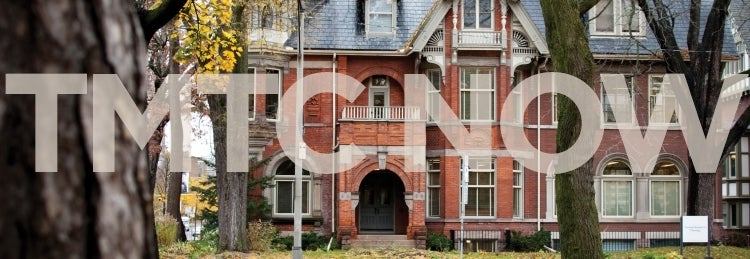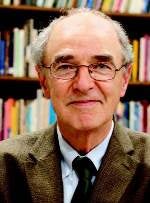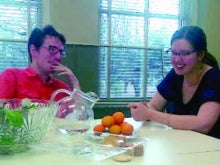
John Rempel, TMTC director, is co-director of one dissertation committee and member of two other dissertation committees. He is also a reader for two upcoming comprehensive exams of students affiliated with TMTC. On October 7, 2013 he delivered a keynote address entitled, “Utopian and Nonconformist: A Tour Through Mennonite and Quaker History” at the Pennswood Village Retirement Centre in Newtown, PA. He also taught, “The Eucharist/Lord’s Supper in Ecumenical Perspective,” this Fall semester.
Editorial
By John Rempel, director
The first term of my second year has passed quickly and profitably. I have gradually met and work with other faculty members of the Toronto School of Theology. I have the clear sense that we are welcome on campus. As the only Peace Church and Free Church affiliated with TST we have the opportunity to bring those perspectives into the various settings we are part of. Of equal value, of course, is the learning our students, our honourary associate Lydia Harder, and I do from the colleges of other Christian traditions. The Mennonite Centre at TST will always be a modest undertaking. That isn’t to say,however, that it has reached its full potential. Let me mention only three explorations that are now on our horizon. The greatest need that TMTC related doctoral students have impressed upon us is the lack of teaching opportunity as they prepare to enter the job market. We have applied to a foundation for an annual teaching fellowship that would provide the funding for a student to teach at one of the Mennonite colleges and seminaries in North America. One of the TST colleges has raised the possibility of bringing courses from Grebel’s Peace and Conflict Studies programme to the Toronto campus under TMTC’s sponsorship. Finally, ministers and members of Toronto area Mennonite congregations have shown an interest in TMTC as one resource for their needs and a place that can help make a Mennonite understanding of the Gospel more visible in this metropolis. It’s a privilege for me to work here.
News
Susanne Guenther Loewen, fourth-year doctoral student in theology at Emmanuel College at TST and former TMTC graduate student assistant, was awarded a Doctoral Fellowship by the Social Sciences and Humanities Research Council of Canada (SSHRC) for her research in nonviolent interpretations of the cross in feminist and Mennonite theologies.
Professor Jeremy Bergen, Conrad Grebel University College, is a member of two comprehensive exam committees.
Kim Penner, a second-year doctoral student in theology at Emmanuel College, TST, has stepped into the role of graduate student assistant at TMTC working alongside TMTC director, John Rempel. Kim is excited about her new role and considers it an opportunity to promote the vision and goals of TMTC while building deeper relationships with the TMTC community in particular and the Mennonite Church community more broadly. Kim’s doctoral research brings together feminist and Mennonite voices regarding the topic of sexual ethics and, in particular, the use of scripture as a source for Christian sexual ethics.
Arnold Snyder, professor emeritus of history at Conrad Grebel and the University of Waterloo, gave a lecture at TMTC on October 1 on the theme, “Ideological Factors in Anabaptist Historiography of the Past Generation”. Vigourous discussion followed his presentation.
Congratulations to Jonathan Slater on the successful defense of his dissertation on May, 16 2013. The title of his completed dissertation, is “Karl Barth’s Doctrine of Baptism: An Assessment of its Plausibility as Exegesis,” and was under the direction of Joseph Mangina at Wycliffe College. Jonathan graduated from St. Michael’s College.
An Interview with Advanced Degree Students’ Association (ADSA) President and TMTC Affiliate Michael Buttrey
By Kim Penner
What are the highlights of being ADSA president?
Although it doesn’t happen very often, getting to make decisions is definitely a perk! The ADSA board operates by consensus, and we’re all unpaid volunteers, so I certainly can’t dictate what we do. Still, I’ve enjoyed having more input into our advocacy, budget, and conference this year. Another highlight is the social aspect: being “forced” to meet new students and get to know our board members better – they’re a fun group!
What are some of the challenges?
A key challenge is communication. It’s tempting to do everything through e-mail, but even the most carefully crafted message can appear ambiguous, brusque, or irrelevant. Meeting in person takes time, but allows much more nuance and participation. Another challenge is representing students at meetings of the TST Board of Trustees. The real power at TST is vested with the heads of colleges, so the most I can do is ask questions or offer feedback while trying not to appear obstreperous.
Has Mennonite theology influenced your approach to being president?
I’ve definitely been discovering the practical relevance of the Mennonite emphasis on holding peace and justice together. Student politics can be passionate, and so at times I’ve had to practice being conciliatory and defusing tensions. On the other hand, faculty, staff, and administrators have considerable power over students, so I’ve had to learn to advocate for student interests more forcefully than comes naturally. Finding the right balance is difficult, but it’s a familiar challenge for Mennonites, and therefore I’m slowly learning to draw on the example of the Mennonite tradition.
Michael Buttrey and Susanne Guenther Loewen enjoy fellowship time at the TMTC Advent Potluck.
Martha Smith Good engages the TMTC Women’s group via Skype.
TMTC Women's Group Fall 2013
By Kim Penner
The TMTC Women’s Group is up and running for yet another year. Our time together is greatly appreciated and consists of listening, sharing, and supporting one another, as well as theological discussions related to our experiences as women in the academy and/or ministry.
The group has met a couple of times in the past three months. Our first event took place in October with a potluck dessert. It was a good occasion to reconnect after the summer, greet new members, and share with one another about where we are at in our work, lives, and school. Then, on November 27, Michele Rizoli hosted five of us in her Toronto home where we spoke with Martha Smith Good, one of the first Mennonite women in Ontario to be ordained. Our conversation took place over lunch where we skyped with Martha since the weather made it difficult for her to travel from Stratford, ON to Toronto that day.
Martha shared experiences that she wrote about in her self-published memoir including what it was like to be one of four women at Anabaptist Mennonite Biblical Seminary in the seventies, early experiences of being Mennonite and feminist, and her journey to being ordained. It was an inspirational time, one that encouraged us to consider the impact that forerunners, like Martha, and their engagement with feminist theology and biblical interpretation, had on the role of women in the Mennonite church. We also had a chance to reflect on current attitudes toward feminism amongst Mennonites today. We all acknowledged that there is more work to be done to dismantle systems of oppression (e.g. sexism, racism, and classism) in our churches and our schools, but feel inspired by Martha’s example, which we will hold dear to us as we continue in our academic and ministerial endeavors.
Martha’s memoir is titled, One Woman’s Journey into Pastoral Ministry. If you are interested in purchasing a copy, please contact her at mg.good@me.com.
Between Indigenous and Settler Cultures: Engaging
Buffalo Shout, Salmon Cry
(Herald Press, 2013)
On March 18, 2014 from 4:30 – 6:30 in Boardroom 1 of the Toronto School of Theology building (47 Queen’s Park Crescent East) TMTC is hosting an event that brings together a diverse group of panelists to respond to some of the issues raised in the book, Buffalo Shout, Salmon Cry, edited by Steve Heinrichs and recently published by Herald Press. We encourage you to save the date to join us for this event. We also welcome the participation of TMTC students who are interested in helping with the planning.
TMTC Director John Rempel
Spring June 9 – 20, 8:30 am – 12:00 pm at Conrad Grebel University College
TS 633 - Contemporary Mennonite Theology
(0.50) - LEC Course ID: 012806
This course is a survey of defining theological, ethical and spiritual writings in sixteenth century Anabaptism and its descendent movements, especially Mennonites. It offers an understanding of the religious and cultural forces that have shaped this tradition. It focuses especially on the flowering of North American Mennonite theology throughout the twentieth century and of global Mennonite theology after 1975. The course will proceed in a modified seminar format with an introductory lecture to each day’s topic.
Call for Papers: Wading Deeper: Anabaptist-Mennonite Identities Engage Postmodernity
The theme of this, the sixth Graduate Student Conference initiated by the Toronto Mennonite Theological Centre, reflects the idea of current Anabaptist-Mennonite scholars taking “acculturation” one step further, wading into the messiness of “the world” through the recognition and exploration of multiple voices, contexts, and identities among Anabaptist-Mennonites. Signs of this reality are apparent in academia: perhaps more than ever before, Anabaptist- Mennonite scholars can be found in every discipline in public universities. The reverse is also true: Mennonite colleges and universities are diversifying their programmes beyond the disciplines of Bible, theology, and music alone, revealing that Anabaptist-Mennonite scholars are deeply engaging the “waters” in which we find ourselves. In that spirit, this conference seeks to explore the cutting edge(s) of Anabaptist-Mennonite thought through inviting Mennonite and like-minded graduate students to present their academic research in a collegial interdisciplinary context. Participation of students from a wide variety of disciplines is encouraged.
As part of the conference this year, we are pleased to announce a keynote speaker who has joined the Mennonite academy relatively recently. Peter Dula is Associate Professor of Religion and Culture at Eastern Mennonite University in Harrisonburg, Virginia. After receiving a Ph.D. from Duke University in theology and ethics in 2004, he worked as the Mennonite Central Committee Iraq Program Coordinator before coming to EMU in 2006.
Possible paper topics include but are not limited to the following:
- Mennonitism as mono-cultural vs. multi-cultural and multi-ethnic – Germanic heritage(s) and new Ana-baptist visions
- Unity and multiplicity in Mennonite theology and ecclesiology – one doctrine, many theologies?
- Interreligious and interdenominational Mennonite dialogues as a form of peacemaking (Mennonite-Muslim dialogue, Mennonite-Catholic dialogue, Lutheran apology to Mennonites, parallels between Mennonite and Jewish experiences)
- Mennonite political allegiance(s) – identities of dissent and protest, adult baptism as a subversive political/theological act, nonconformity and radicality. Can include Mennonite intersections with feminist, liberationist, and queer theologies/theories.
- Mennonite peacemaking – from nonresistance to conscientious objection and nonviolent responsibility (development, mediation, reconciliation, etc.)
- Persecutions, both real and remembered – global Mennonite suffering and martyrdom, past and present
Possible disciplines: theology, biblical studies, ethics, philosophy, religious studies, sociology, diaspora studies, history, literature, musicology, international development studies, peace and conflict transformation studies, etc. The conference will take place May 30 to June 1, 2014 at Canadian Mennonite University, Winnipeg, Manitoba.
*Please send paper proposals of maximum 300 words to mennonite.centre@utoronto.ca by January 15, 2014.
Bruxy Cavey and the Megachurch Model
By Layton Friesen
On the evening of October 30th TMTC hosted Bruxey Cavey, teaching pastor of The Meeting House, for a discussion on the topic, “What happens when the stereotype of the mega-church doesn’t fit?” The Meeting House is a mega-church within the Brethren in Christ tradition of Anabaptist churches. Its existence as one of the biggest churches in Canada may come as a surprise to many Anabaptist-Mennonites who are part of smaller and/or dwindling congregations.
The first half of the evening consisted of Cavey sharing with us about the philosophy and practices of The Meeting House. Cavey emphasized that to outsiders, The Meeting House looks like a mega-church with a small-group ministry. From the inside, however, they consider themselves a community of home churches that meet together for corporate worship events. The real work of discipleship, fellowship, and accountability, happens in homes, which is also where the Lord’s Supper and church discipline takes place. Thus, although The Meeting House is comprised of thousands of members, a sense of community remains strong and integral as home churches are where “real church happens,” to quote Cavey.
Following Cavey’s presentation there was time for questions. During this time considerable discussion ensued about what The Meeting House meant by its slogan: “A church for people who aren’t into church.” According to Cavey, they have relentlessly tried to keep worship and what it means to be a Christian focused on imitating Jesus rather than traditional elements of worship such as pews, which may act as a barrier for people who are put off by reminders of “traditional” church. Along the same lines, Cavey emphasized that he tries to teach (i.e. preach) in a way that does not come across as angry or passionate, but rather calm and the same as his regular speaking voice because even the traditional style of preaching, which according to Cavey comes across as angry, turns people off and thus prevents them from getting to know Jesus. According to The Meeting House, the trick is for the church to get out of its own way.
I appreciated Cavey’s humble warmth and kind spirit. I think The Meeting House is not a phenomenon that can easily be replicated by other Mennonite churches. It also poses some challenges for Anabaptist ecclesiology. However, Christ is preached and many follow the Lord there and for that I am thankful.
Toronto Mennonite Theological Centre
TMTC helps form theological leadership for the church by providing and
supporting graduate theological education, particularly at the doctoral
level, from a Mennonite perspective in an ecumenical context.
IN TORONTO:
• Graduate courses and student
advising
• Ecumenical conversations (e.g.,
Mennonite-Catholic dialogue)
• Special lectures and panels
• Scholars’ Forum (for local and
visiting students and faculty to
present research and receive
feedback)
• A. James Reimer Award (an annual
doctoral scholarship)
AND ACROSS NORTH AMERICA:
• Graduate student conferences
• Anabaptist-Mennonite Scholars
Network
• AAR/SBL academic forums
• Muslim-Christian dialogue
• Conferences and consultations
• Sabbatical residence for visiting
faculty
TMTC is a graduate teaching and research affiliate of the Toronto School of Theology (TST) administered by Conrad Grebel University College with oversight from an Advisory Board made up of representatives from Mennonite educational and denominational institutions in Canada and the United States.
TMTC was established in 1990. It participates in the life of TST, its ecumenical spirit, its teaching and research, its engagement with culture. It promotes Mennonite scholarship in the academy in conversation with the broader Christian tradition as well as with other religious and secular traditions. It nurtures the development of committed and well trained leadership for the church. It is the only Mennonite venture in doctoral level education in North America and as such is a key resource in nurturing the next generation of scholars and professors for the Mennonite Church and its universities, colleges and seminaries
TMTC helps form theological leadership for the church by providing and supporting graduate theological education, particularly at the doctoral level, from a Mennonite perspective in an ecumenical context.
To make a donation to TMTC, please make cheques payable to
Conrad Grebel University College, specifying ‘TMTC’ in the memo line. Interested donors may contact
Fred W. Martin.
TMTC Staff:

John Rempel,
Director

Kim Penner,
Graduate Student Assistant
Advisory Council
- Anabaptist Mennonite Biblical Seminary
- Canadian Mennonite University
- Eastern Mennonite Seminary
- Mennonite Church Canada
- Mennonite Church Eastern Canada
- Mennonite Education Agency
- (Mennonite Church USA)
TMTC Administered by:
Conrad Grebel University College
Contact info
Toronto Mennonite Theological Centre
47 Queen’s Park Crescent East
Toronto, ON M5S 2C3
416-978-6078
mennonite.centre@utoronto.ca
www.grebel.ca/tmtc

 Michael Buttrey and Susanne Guenther Loewen enjoy fellowship time at the TMTC Advent Potluck.
Michael Buttrey and Susanne Guenther Loewen enjoy fellowship time at the TMTC Advent Potluck. Martha Smith Good engages the TMTC Women’s group via Skype.
Martha Smith Good engages the TMTC Women’s group via Skype.






